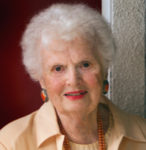By Natasha Josefowitz, ACSW, Ph.D.

LA JOLLA, California — The other day, a friend of mine said that she was afraid of curbs. “Why?” I asked, surprised.
“Because I can’t see as well, and I could fall,” she replied.
This startled me. I started wondering whether I, too, worry about curbs. Sure enough, I have become aware that instead of stepping off mindlessly like I have all my life, I now stop, look, and place my foot down carefully. This brought to my mind all the things that I am afraid of, or rather people my age—older folks—begin to worry about. I wondered if fears change not only for the aging population, but also through decades, regions, and cultures as world events impact one’s well-being.
Fears change with generations. I remember when I was in high school we had drills where we had to crouch under our desks to protect us from the possibility of the ceilings falling on us due to Russian attacks. When my children were young, we were afraid of polio with every sore throat. Then a generation later, we were afraid of AIDS, and now of course, we have COVID-19 to worry about.
Political fears also change. As a child in Paris, we were afraid of the Nazis using mustard gas. My parents in Russia were afraid of the Bolsheviks. Today we worry about the escalating controversy with China. Some fears are mostly geographic. There are countries facing famine, regions facing droughts, floods, or locusts.
Most fears fall into three categories: personal, universal, and global. Personal fears are the ones that are common, but not shared by most people. Some of us are afraid of heights, some of flying, others of snakes or of speaking in public.
Universal fears are those which are experienced by an entire group. When I was young, it never occurred to me to worry about falling. But as people age, falling becomes a universal fear. There are also fears of illness, dementia, loss of autonomy, financial ruin, or losing one’s spouse. Additional fears accumulate with age as one becomes more vulnerable. My grandfather used to recite an old Jewish prayer, “Oh God, please don’t let me die alone, poor, and sick.” These are indeed universal fears.
Global fears change with the times. Centuries ago, we feared Barbarian invasions or the black plague. Today we have a new set of fears: germ warfare; sabotage of the electrical grid; cyberattacks on the computer networks that run our hospitals, schools, and businesses, triggering economic collapse. We see images of wildfires ravaging landscapes, hurricanes devastating towns, droughts so severe that we are on the edge of losing whole species of animals due to disappearing water sources, warming oceans. There are islands in the Pacific that have already disappeared due to rising seas, and their people had to be evacuated. We worry about what kind of planet our grandchildren will inherit and about our grandchildren’s children with coastal flooding seemingly inevitable due to global warming. By mid-century there will be whole populations forced to move inland. These are the global fears, those that threaten our planet and about which we can prepare with wind farms, solar panels, vaccinations, recycling, going green, and desalinization plants; we need to strive for better planning in light of the inevitable problems that will occur, if not in our lifetime, then in the lifetime of our descendants, in order to leave a legacy of a viable earth.
Then there are our irrational fears, those that may not occur. For instance, when my husband was late coming home from work, I envisioned him having an accident or a heart attack, alone on a deserted road. Whenever my children and grandchildren are flying somewhere, I have plane-crash anxiety. Every time I misplace something, I am afraid it is a sign of Alzheimer’s.
Obviously being anxious about events that probably won’t happen is not only unpleasant, but bad for our immune systems. Feelings of anxiety impact our health. Instead of anticipating worst-case scenarios, we should try to let go of the negative thoughts and concentrate on positive outcomes. Changing our mindset is difficult, we need to occupy ourselves with tasks that need concentration. Being physically active also helps to curb our concerns. It is normal for many of us to feel anxious about the current state of the world. Reading the daily news only exacerbates our feelings of powerlessness. If we can’t find a way to manage living with today’s fears, it may be beneficial to seek the help of a healthcare professional.
We are all in this together!
© Natasha Josefowitz. This article appeared initially in the La Jolla Village News. You may comment to natasha.josefowitz@sdjewishworld.com